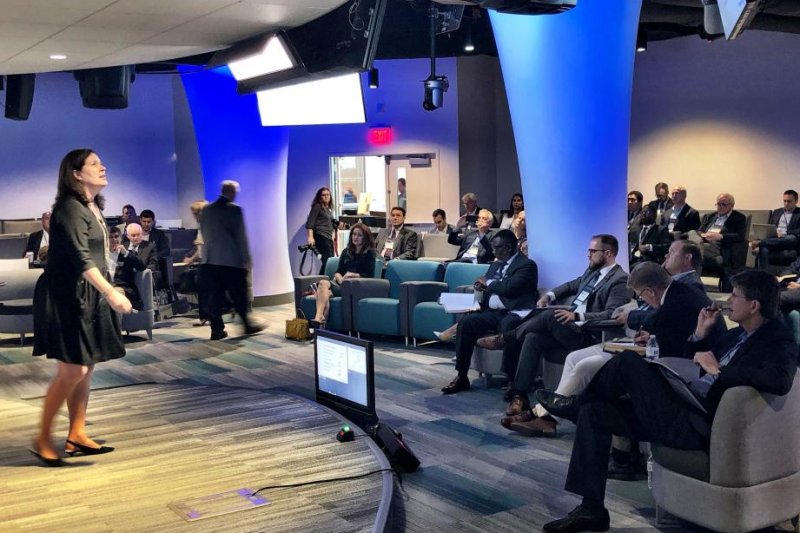June Adams, CEO and co-founder of PowerCalc, an electrical engineering software company, presents at the Florida Aerospace Capital Forum in Orlando on Wednesday. Photo by Paul Brinkmann/UPI
ORLANDO, Fla., Nov. 6 (UPI) -- New players in Florida's rapidly expanding aerospace industry came together Wednesday in a funding competition that included innovative ideas ranging from space debris detection to a specialized antennas for small satellites.
"We believe this is one of very few events like this in the U.S. where new companies focused on aerospace compete for investment," said Frank DiBello, president and CEO of Space Florida, the state's marketing and development agency for space.
Sixteen companies competed for $100,000 in investments at the second annual Florida Aerospace Capital Forum in Orlando's Lake Nona suburb.
Boca Raton, Fla.,-based Launchspace Technologies Corp. pitched its system for detecting and removing orbiting space debris, which has been identified by federal agencies as a growing problem.
"Our space-based sensors will detect all orbital debris, and have customers either maneuver away from large debris, or Launchspace will use large debris impact pads ... to remove small orbital debris," said John Bauman, CEO of Launchspace.
The company designed sensors that can scan orbital planes for the tiniest, fastest moving particles of space trash, and the first sensor was built by defense contractor L3 Technologies, now L3 Harris, for the U.S. government.
Bauman said he has interest from the Pentagon and the International Space Station National Lab to install the sensors on the space station.
Another company, Rockledge, Fla.-based Helical Communication Technologies, presented a new design for antennas on small satellites, which is a market that is expanding exponentially with planned launch of thousands of new communication satellites by companies such as SpaceX and OneWeb.
HCT said the circular design of its antennas provide a tight beam of radiation that results in less interference or signal fade.
"We're competing for a very small portion of a very large audience," said Greg O'Neill, the company chairman. "Two satellites with our antennas were launched in 2018. We have many clients in the wings that request specialized antennas like this."
Aerial drones that can scan disaster zones, such as a hurricane landfall area, are the product of Daytona Beach, Fla.-based Censys Technologies.
The system can help insurance firms avoid millions of dollars in fraud by scanning homes for damage, said Trevor Perrott, the president and CEO.
Censys has $35.5 million in committed contract sales, he said. He was seeking up to $2 million in new investment to fund company expansion.
Other companies at the event were:
Alertgy, of Melbourne, Fla., which says it has developed the first wearable noninvasive continuous blood glucose monitor to alert patients and caregivers when people with diabetes get low glucose levels, via a smartphone app. Company founders said it could also help track astronauts' health conditions.
Bulk Nano, of St. Petersburg, Fla., has built its own manufacturing workshop to produce nanotechnology materials. It is manufacturing fiber reinforced composites for such uses as battery containment and explosion-protection suits.
Capacitech, of Orlando, is working on commercialization of advanced energy storage technology from the University of Central Florida.
Everix, also of Orlando, creates high-performance light filters or lenses for use on specialty eyewear, LiDAR domes and other applications that could be used in space.
Helicon Chemical Co, of Orlando, develops and manufactures next-generation rocket fuel for the military and commercial space industries, with the aid of nanotechnology.
InitWeather, of Melbourne Beach, Fla., uses artificial intelligence and advanced data collection technology to develop more accurate weather forecasts for the aerospace industry.
Sensatek Propulsion Technology, of Daytona Beach, produces wireless sensors for measuring temperature, pressure and strain in extreme environments such as rocket launch pads.
SynMatter, of Merritt Island, Fla., provides anti corrosion microparticles, which release corrosion inhibitors under certain conditions.
PowerCalc, of Delray Beach, Fla., provides software that completely automates electrical engineering calculations.















